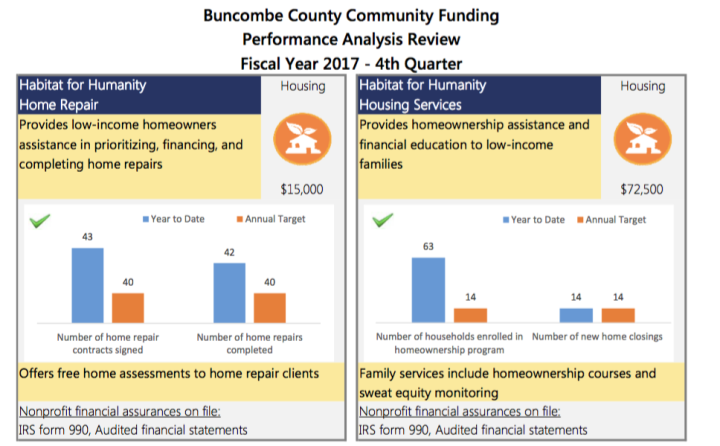In exchange for the $15,000 Buncombe County allocated to support Asheville Area Habitat for Humanity’s low-income home repair program last year, the nonprofit pledged to complete 40 repair projects. By the end of the fiscal year on June 30, the organization had exceeded that goal, completing 42 repair contracts.
That’s how it’s supposed to work: Based on a nonprofit’s focus and mission, county staff sets specific annual targets for its performance. Funding recipients submit quarterly reports to help the county ensure that the organizations stay on track to deliver the results they promised. And, at least in principle, falling short of the annual goal is likely to result in future grants going to another recipient.
But are the performance measures succeeding in holding all the funded organizations accountable for achieving their stated goals? Data show that $116,000 is currently directed to nonprofits that are failing to meet objectives. And seven of the nonprofits that didn’t meet their goals for the fiscal year that ended on June 30 also missed their targets in the previous fiscal year. Five of those have not met their performance goals for two consecutive years, but nonetheless received funding in both the previous and current fiscal year.
In all, $1.3 million was awarded to 36 nonprofits for 63 programs for the fiscal year which began on July 1. Of those programs 52, or 83 percent, met their prearranged metrics. However, 9 percent of the $1.3 million is going to organizations that haven’t met their goals. At the same time, 23 other nonprofits competed unsuccessfully for the same funding, meaning that some groups with substandard performance relative to their goals beat out organizations that were not awarded county grants.
Quarter past due
Buncombe County’s community grant program helps support nonprofits’ and some municipalities’ efforts to provide valuable services not otherwise offered. County guidelines state that when an organization gets county dollars, it must meet agreed-upon performance standards or face the potential of being cut off. “Nonprofit agencies will be funded only through a performance contract that is monitored and evaluated by the contracting department throughout the year and only renewed if the performance criteria have been achieved,” reads the resolution that established the policy.
That resolution, Guidelines for the Funding of Nonprofit Agencies, is a nonbinding set of management practices adopted in 2008.
Since the annual reporting schedule mirrors the county’s fiscal calendar, however, the end-of-year reports that tell commissioners whether an organization met its benchmarks aren’t available until after grant funding for the next year has already been approved.
“That’s an issue and one of the things we can look at,” says Rachael Nygaard, the county’s director of strategic partnerships. “Is there a creative way around it? Because it does create a fundamental disconnect making a decision based on performance but not all performance information is in. We need to look at it and see if there is a better way to do it.”
In fact, commissioners are slated to look at the way community grant funding is being approached; that analysis could mean an overhaul, minor tweaks or no change to the current policy. Xpress reached out to Commission Chair Brownie Newman for his thoughts but did not hear back from him before our deadline.
“Things are out on the table for discussion and potential changes. We know what we want to get out of the process… We want it to be transparent, accountable, impactful in the community, aligned with county priorities,” says Nygaard.

Sign the dotted line
Xpress spoke to two nonprofits for this article: Habitat for Humanity, which achieved its goals last year, and Asheville Museum of Science, which didn’t.
“We take our contract with donors seriously, and if we said we would use their gift to build 14 homes and repair 48 homes, we do all we can to make that happen,” says Andy Barnett, executive director of Asheville Area Habitat for Humanity. Last fiscal year, the nonprofit received $87,500 for home repair and homeownership assistance programs. In exchange for the money, Habitat agreed to complete 40 home repairs and close on 14 new homes; the organization exceeded the first and met the second of those goals. The nonprofit is getting a combined $85,000 for both programs in the current fiscal year.
The Asheville Museum of Science didn’t fare as well relative to the goals the county set for its performance. “As with funding from any source, we want to meet the goals set forth in the original request. The museum is certainly aware of our goals and our actual numbers for the generous Buncombe County funding,” says Alison Gooding, the institution’s development director. Last fiscal year, AMOS received $75,000 and agreed to host 42,321 visitors and 6,390 Buncombe County students. The museum ended up achieving 68 percent of its overall visitation goal and 70 percent of its goal for students. County commissioners granted the organization $13,800 for the current fiscal year.
The museum’s move into a new space at 43 Patton Ave. in the Wells Fargo building downtown left it closed for about four months last year. “If the museum would have been open from August through November 2016, AMOS would have been much closer to, or even over, the projected numbers,” explains Gooding. “Reliable funding is always a concern with nonprofits, and the museum is not free of that concern. The aim is to prove that AMOS is a positive addition to Buncombe County that merits future support. We are confident that we can prove the value but have minimal control in how future funding decisions will be made.”
Metric or millstone?
Do the organizations feel the benchmarks are fair targets? “They are realistic; we make sure of that when we apply,” Habitat’s Barnett says. “However, each year we aspire to build and repair more homes than we did the year before. We take our aspirational goals and associated increases in building costs, and tailor our request to accomplish more,” he notes.
Gooding agrees, noting that accountability metrics can also evolve. “We would be open to considering other objectives but appreciate having a baseline from which we can report back on subsequent years,” she says. “Other data that AMOS will be gathering will support the value of having a family-friendly, science education destination and resource in Asheville and WNC.”
So what does the county do when it sees an organization falling behind its goals? “Organizations are great to keep us informed when things are changing,” explains Nygaard. “If they submit a quarterly report with a number lagging what they anticipated, there is almost always some kind of note explaining. And often we reach out and have a conversation, so we keep in touch as the year goes on and not just wait three more months.”
For those meeting goals on a year-to-year basis, there’s a tendency to ask for the same level of funding, or an increase, for the following year. “It’s tempting to make a pitch here for more funding so that our metrics are even better,” says Barnett. “However, we recognize that Buncombe County funds many worthy causes in our area and partners with Asheville Habitat in many ways. We would advocate for more funding, in general, for home repair… It is critical to keep local families in homes they already own, but cannot afford to keep up.”
Money back guarantee
To find out what recourse the county might have if nonprofits fail to meet their targets, Xpress asked whether clawback measures similar to those attached to Buncombe County’s economic development incentives could be implemented for community grant funding.
In the case of economic development incentives, a business must agree to create a certain number of jobs or invest a set amount of money in the county. If an incentive recipient fails to meet those goals, some or all of the money won’t be disbursed. For example, the county docks a percentage of the incentive amount if job creation numbers don’t meet benchmarks.
With regard to the feasibility of instituting similar provisions for nonprofit funding recipients, “I think it’s a structure that makes sense and would like to see what [the commissioners’] thoughts are on it,” says Nygaard.
“Right now there aren’t clawback measures, or other penalties or incentives that are fiscal… The community looks to us to use the funding in an accountable way that’s going to make the most impact possible. Is there a way to be more strict with those outcomes? I think that is something that we would look at,” she notes.
Nygaard sees the potential for protecting investments, but she stresses the intent of the community grant funding is different than economic development programs. “Any change in funding to community organizations doing community work has an impact, so it’s something we need to think about carefully,” noting changes would need to be “sensitive to the needs of the organization and the people they serve.”
And while commissioners will ultimately drive any potential changes to the community grant money distribution, Nygaard sees an environment ready to explore change: “This particular board and manager have been excited to delve more deeply into issues than maybe they have in the past.”






What do you expect when the role of government now is wealth transfers and gimmies. Wanda Green is looking to be corrupt and more than likely, a whole lot of money was given to her friends over the years in the non-profits. It’s also why you have tens of billions of property tax exemptions even though some of these entities own prime real estate. And are buying up more of it. You talk about a housing crunch yet won’t touch the role that these non profits play in owning land holding and not paying a dime in taxes. Which inflates the price for everybody else. It’s a scam that will bring down not only Green, but hopefully a lot of current and former members of both council and the commission.